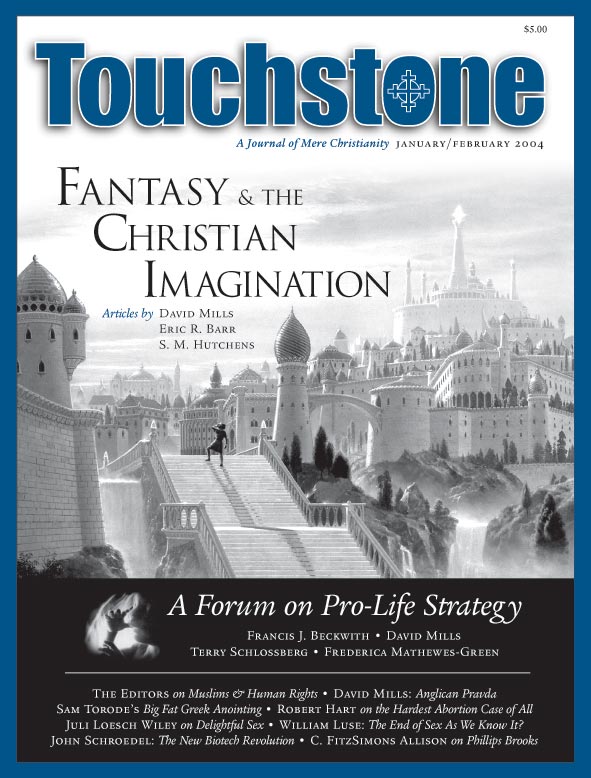Muslims & Human Rights
In the memories of most of us, Islam was no big player on the geopolitical field. Our mental horizon after World War II was dominated, rather, by the threat of Communism, and if we gave even a thought to international Islam back in those days, it was certainly not in terms of grandeur. Even less in terms of danger.
Obviously, everything is changed now. At present we are distinctly aware of the large presence of Islam on the world scene, and we think of that presence very much in terms of danger. This is the case because over the past decade and a half certain unusually bad persons have instructed us on the point, attacking American embassies, troop barracks, both military and commercial ships, and, more recently, even sites here in the homeland.
Consequently, during the nation’s present executive administration, we Americans have done a thing hardly any of us could have imagined even twenty years ago: sent forth armies to wage war, and to change the governments, in two Muslim countries.
Now if we may say so, this kind of thing really does require some getting used to. Whereas our wars against Nazism, Fascism, and Communism had seemed confidently modern, going to battle against the armies of the Prophet strikes us as downright medieval. Muslims? Goodness, aren’t they the ones who live in tents out in the desert and ride on camels? Why beat up on people still living, not only in the Middle East, but in the Middle Ages?
Until recently, in fact, when the fall of the Soviet Union and the changing political faces of Asia and Latin America obliged us to mind our words more carefully, we were accustomed to lump most Muslim countries into the “Third World,” a category suggesting both poverty and powerlessness. For many of us, the word Muslim was nearly a synonym for “simply out of date.”
Nor was our impression of the matter altogether erroneous. The world of Islam is very much out of date, in the sense that only a few Muslim countries enjoy the greater benefits of modern life, such as self-government, liberal institutions, and a coherent, free-market economy.
Muslim Facts
It is a fact that many of the world’s Muslims today live under theocracies, tyrannical dynasties, and military dictatorships, and in spite of all the jokes and other talk about “Arab money,” there is widespread poverty in that part of the globe. Bernard Lewis (What Went Wrong?) cites a World Bank estimate that “the total exports of the Arab world other than fossil fuels amount to less than those of Finland.” With few exceptions (Malaysia, happily), Islamic countries have not benefited much from that “worldwide liberal revolution” documented in Francis Fukuyama’s The End of History and the Last Man.
That is to say, Muslims would appear to be just the sort of people that generous Americans would be more disposed to help, much as we have helped other impoverished and oppressed nations over the years. For that reason, going to war with Muslims would seem very strange indeed.
With respect to the invasions of Afghanistan and Iraq, spokesmen for our government have announced, again and again, that America is not at war with Islam, but with evil men who bolster their evil designs by appealing to the Muslim religion. Although we believe these official protestations to be both sincere and correct, it is useful to remember that our enemies see things very differently. As indicated by their constant appeals to jihad with respect to the United States, it is obvious that some Muslims do see the matter in religious terms.
In fact, this phenomenon of jihad is a clear symptom of Islam’s current plight, because hardly anything seems so outdated as a religious war. Whereas here in the West we were instructed, centuries ago, to render unto Caesar the things that are Caesar’s and to God the things that are God’s, classical Islamic theory recognizes no such distinction. Islam’s Sharia, or Holy Law, is the basis of all law, and therefore of all political life.
Until some fairly recent experiments, there has never been a true separation of State and Mosque, and even now the idea is odious to those very individuals and groups around the world that wish us ill. As Bernard Lewis has suggested in The Crisis of Islam, Muslims have still not entirely come to grips with the loss of the universal caliphate after World War I.
Heaven knows, however, some Muslims today are really trying to do so, as witnessed by their repeated efforts to establish “Islamic republics.” It appears to us that most Muslim people truly want these blessings and are willing to cooperate with the West in pursuit of them.
And as American Christians this is what we want for them as well. It is manifestly in no one’s best interest that anyone else in the world should suffer from poverty and oppression. Hence, it would be a great tragedy if our current preoccupation with international terrorism should obscure in Christian hearts the divinely imposed obligation to love our neighbors as ourselves.
For this reason also, plain and simple charity prompts us to applaud the toppling of tyrannies, and it warms the heart to see those published pictures of busy marketplaces, through which Afghan and Iraqi children walk to school, while their elders begin national experiments in democracy and free economy. Indeed, the widespread and spontaneous welcome given to American troops by the liberated peoples of Afghanistan and Iraq argues that our friends in that part of the world greatly outnumber our enemies.
A Continuing Problem
We take heart from that thought, because certain aspects of Islam suggest that our relationships with Muslims may be worrisome for years to come. We are especially burdened with two concerns: the ongoing persecution of Christians by Muslims, and the continued recalcitrance to political reform within Islamic nations. We may consider these in reverse order.
First, we believe that chronic resistance to political reform is the major cause of the poverty and desperation evident among Islamic peoples. This assertion defies, of course, the currently dominant theory that the “root cause” of the social problems of the Islamic world is the State of Israel.
To us this latter theory seems entirely unfounded. It appears obvious, rather, that the presence of Israel in the Holy Land, while it is certainly a cause of great affliction to the people of Palestine, does not even begin to explain the grinding poverty and despondency pervasive in other Muslim countries. No one has sufficiently explained how the Sudanese, Turks, Libyans, Syrians, and Iranians would be better off if there were no Israel. We see no reason to believe that, if Israel were to disappear from the face of the earth today, we in the West would be one whit safer from fanatic Muslims tomorrow.
It seems to us, on the contrary, that the State of Israel has served chiefly as a limp excuse to exonerate those who are really responsible for the political stagnation that endures throughout much of the Middle East. And this widespread political stagnation, we believe, best explains the ongoing economic paralysis prevalent in that part of the world.
Second, with respect to the Muslim treatment of Christians, we are once again aware of how much our world has changed since yesteryear. It was not so long ago that Communists were the chief persecutors of Christians. When we spoke of “the suffering church,” we usually meant those who were oppressed behind the Iron Curtain. In truth, that persecution was already beginning to weaken, even before the Berlin wall came down, and now Christian missions are thriving in countries where they were terribly oppressed during our youth.
So where are Christians being persecuted in the world at present? Chiefly in places where militant Muslims have ready access to them: Pakistan, Nigeria, Sudan, Egypt, Indonesia, Qatar, Bangladesh, the Philippines, and so on. Christians are also persecuted by others, of course, such as Communists (China, Vietnam, Cuba), Buddhists (Sri Lanka, Nepal), Hindus (India), and sundry oppressors in places like Zimbabwe and Colombia, but by far the most sustained and consistent persecution of Christians throughout the world continues to be inflicted by Muslims. (In each edition of this journal, some of the more notable instances of such persecution are chronicled in our section called “The Suffering Church.”)
To be sure, not all of this Muslim persecution of Christians is government-sanctioned. Nonetheless, we do believe that the problem itself should be approached as a concern of civil rights. And the matter of civil rights again raises the problem of political reform. It is reasonable to suppose that Christians living among or close to Muslims—and truly all of us—will be safer if those Muslims live in true democracies and enjoy, like ourselves, the benefits of liberal institutions and economic prosperity.
A Sign of Hope
Germane to these considerations was the announcement of the Nobel Committee, on October 10, that its prestigious Peace Prize was awarded to Shirin Ebadi. The brief account of her life published by the committee at the time of its announcement amply justifies its choice.
An Iranian lawyer and human rights activist, a compassionate champion of oppressed women, exploited children, and neglected refugees, Shirin Ebadi represents a profile of modern Islam that does not receive much notice over here. Until the 1979 revolution forced her to resign, she served as a municipal judge in Tehran and has continued active in the Iranian legal system ever since. Moreover, she is familiar with that system from the inside, so to speak, having several times gone to prison for her advocacy of causes odious to the government.
Mrs. Ebadi is particularly noticed by Iranian authorities for her advocacy of the families of writers and other intellectuals murdered in a society where murder is sometimes a deliberate political strategy. Indeed, she still gets threats from the Khomeinists, who see her as an enemy to Islam, but she goes on insisting that “the age of rule by fear is coming to a close throughout the world. So why should Iran be an exception?”
Mrs. Ebadi made that comment in an interview in Politique Internationale, excerpted in The Weekly Standard. According to that source, she does not aspire to political office. She remains, however, what the Standard’s editors call “an alternative source of moral authority” in Islam, arguing for the separation of Mosque and State, discovering a religious basis for human rights in Islamic tradition, and pushing for political reform in the still volatile nation that sits between Iraq and Afghanistan.
All men of good will are encouraged by the assurance that Mrs. Ebadi’s humane voice resonates widely in her own country and that her views are esteemed elsewhere in the world. If her compassionate ideals and progressive aspirations come to prevail in Iran’s political life, we hope that they will continue to further the fortunes of Muslims and alter the face of Islam.
—Patrick Henry Reardon, for the editors
For the biography of Shirin Ebadi, see www.nobel.se/peace/laureates/2003/ebadi-bio.html. The excerpt from the interview with her appeared in the 3 November 2003 issue of The Weekly Standard.
Patrick Henry Reardon is pastor emeritus of All Saints Antiochian Orthodox Church in Chicago, Illinois, and the author of numerous books, including, most recently, Out of Step with God: Orthodox Christian Reflections on the Book of Numbers (Ancient Faith Publishing, 2019).
subscription options
Order
Print/Online Subscription

Get six issues (one year) of Touchstone PLUS full online access including pdf downloads for only $39.95. That's only $3.34 per month!
Order
Online Only
Subscription

Get a one-year full-access subscription to the Touchstone online archives for only $19.95. That's only $1.66 per month!
bulk subscriptions
Order Touchstone subscriptions in bulk and save $10 per sub! Each subscription includes 6 issues of Touchstone plus full online access to touchstonemag.com—including archives, videos, and pdf downloads of recent issues for only $29.95 each! Great for churches or study groups.
Transactions will be processed on a secure server.
more from the online archives

33.1—January/February 2020
Do You Know Your Child’s Doctor?
The Politicization of Pediatrics in America by Alexander F. C. Webster
calling all readers
Please Donate
"There are magazines worth reading but few worth saving . . . Touchstone is just such a magazine."
—Alice von Hildebrand
"Here we do not concede one square millimeter of territory to falsehood, folly, contemporary sentimentality, or fashion. We speak the truth, and let God be our judge. . . . Touchstone is the one committedly Christian conservative journal."
—Anthony Esolen, Touchstone senior editor








